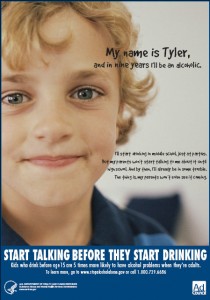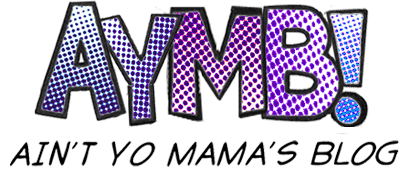02
Start Talking Before They Start Drinking
 Did you know that the month of April has been designated Alcohol Awareness Month? I didn’t either until I was contacted on behalf of the new Underage Drinking website, which was developed by the U.S. Department of Health and Human Services. This new public education website was created in support of the Surgeon General’s call to action to bring more awareness to parents about the negative effects of drinking alcohol at an early age. Alcohol abuse is a critical issue because it remains the biggest substance abuse problem among our youth.
Did you know that the month of April has been designated Alcohol Awareness Month? I didn’t either until I was contacted on behalf of the new Underage Drinking website, which was developed by the U.S. Department of Health and Human Services. This new public education website was created in support of the Surgeon General’s call to action to bring more awareness to parents about the negative effects of drinking alcohol at an early age. Alcohol abuse is a critical issue because it remains the biggest substance abuse problem among our youth.
Some startling facts about underage drinking:
- Children who first use alcohol before the age of 15 are six times more likely to have alcohol problems than those who start drinking after the age of 21.
- 40% of children have tried alcohol before 8th grade.
- 75% of high school seniors have tried alcohol.
- According to the National Institute on Alcohol Abuse and Alcoholism, approximately 5,000 people under the age of 21 die as a result of drinking alcohol.
- 11% of 8th graders, 22% of 10th graders, and 29% of 12th graders have engaged in heavy episodic (binge) drinking.
- Children are starting to drink much earlier than ever before. The average age of first use in 2003 was 14. In 1965, the average age was 17.5.
The new website suggests short and frequent discussions rather than have “the talk” which can be long and intimidating for children. Many children will simply tune parents out, especially if they are being talked *at* and not *to.* When you start a dialogue with your child, make sure to ask them questions and make time for their questions, too. Another important factor is to establish your rules and thoughts on alcohol use early and consistently.
If you need some tips and guidelines about how to talk to your kids about alcohol, this website is a fantastic place to start. Parents will not only be able to gather a lot of useful information, but they can also create a personalized action plan for talking with their child. What you say to a 9 year old boy will obviously be different from what you say to a 19 year old girl. The personalized action plan is a wonderful guideline to help you have those discussions, whether your child is 9 or 19.
If you don’t talk to your kids about drinking, you’re actually saying something. Start early and talk often. I urge all parents to check out this website:
www.underagedrinking.samhsa.gov
Have any comments? Please share!


